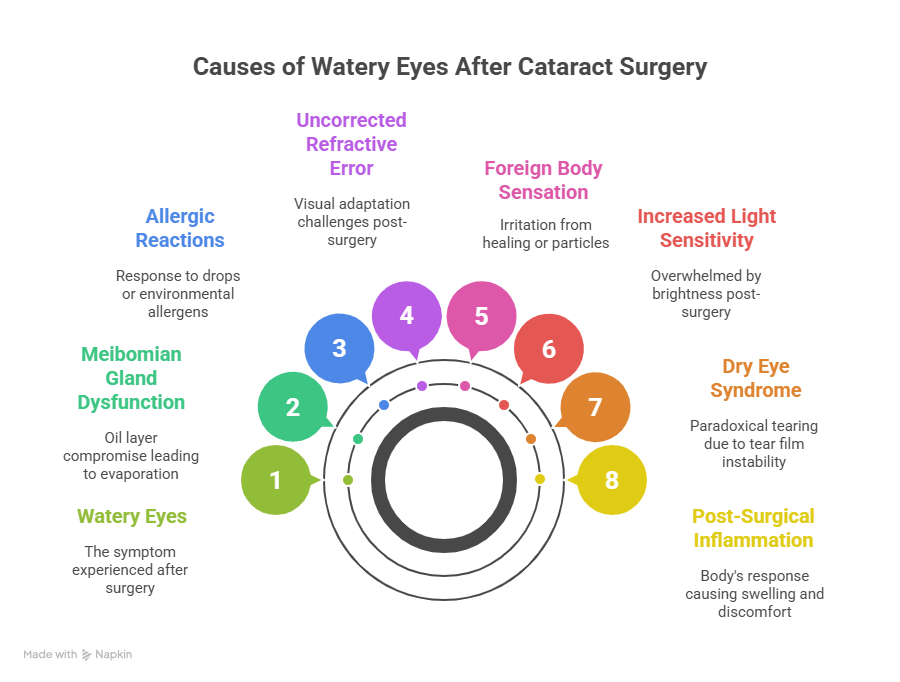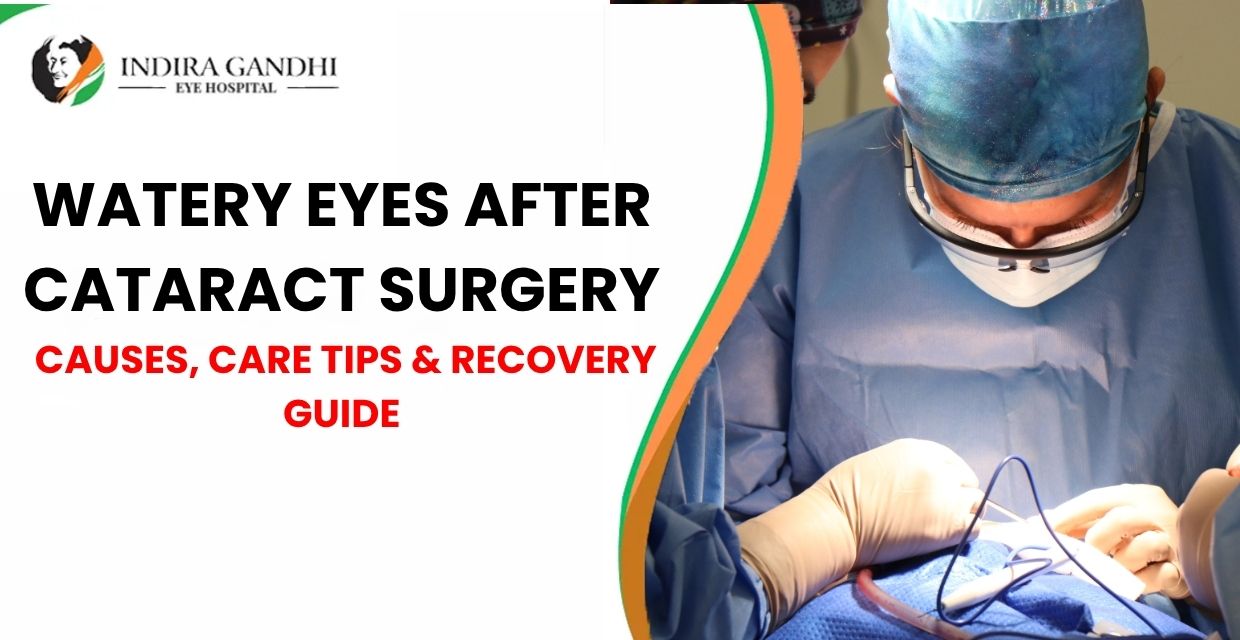|
Getting your Trinity Audio player ready...
|
The journey to regaining crisp, vibrant vision through cataract surgery is an incredibly exciting one. You’ve likely heard about the amazing results – the brighter colors, sharper details, and newfound freedom from blurry vision. But amidst the anticipation, you might also find yourself with a common, yet often perplexing, post-operative symptom: watery eyes after cataract surgery.
It’s a question we frequently address at Indira Gandhi Eye Hospitals: “Why are my eyes watering after surgery, when I thought they’d be clearer?” Rest assured, buddy, while it might seem counterintuitive, watery eyes can be a normal part of the healing process. However, understanding why it happens, what to do about it, and when to seek professional advice is key to a smooth and comfortable recovery. Let’s dive deep into the causes, care tips, and recovery guide for watery eyes after cataract surgery, ensuring you’re well-prepared for every step of your vision restoration journey.
The Healing Journey: Why Watery Eyes After Cataract Surgery Can Occur
Think of it this way: cataract surgery, while incredibly precise and minimally invasive, is still a surgical procedure. Your eye, a remarkably sensitive organ, has undergone a significant change. Its natural response to any form of irritation, inflammation, or even a sudden change in its environment, is often to produce more tears. This reflex tearing is your eye’s way of trying to protect itself, wash away perceived irritants, or soothe discomfort. So, a certain degree of watery eyes after cataract surgery is a very normal part of the initial healing process.
Common Causes of Watery Eyes After Cataract Surgery: A Deeper Look

While the general answer is “healing,” let’s explore the specific mechanisms and conditions that can lead to watery eyes after cataract surgery:
- Post-Surgical Inflammation:
- The Body’s Natural Response: Any surgery triggers an inflammatory response in the body. In the eye, this means temporary swelling of tissues, redness, and discomfort. This inflammation can irritate the delicate nerve endings on the surface of your eye, signaling your tear glands to produce more tears as a protective mechanism.
- Management: This is typically managed very effectively by the anti-inflammatory eye drops prescribed by your surgeon (steroids or NSAIDs). Adhering strictly to your drop regimen is crucial to bring down this inflammation and, consequently, reduce tearing.
- The Body’s Natural Response: Any surgery triggers an inflammatory response in the body. In the eye, this means temporary swelling of tissues, redness, and discomfort. This inflammation can irritate the delicate nerve endings on the surface of your eye, signaling your tear glands to produce more tears as a protective mechanism.
- Dry Eye Syndrome (Paradoxical Tearing):
- The Counterintuitive Culprit: This is one of the most common, and often confusing, causes of watery
eyes after cataract surgery. When the eye is truly dry, it paradoxically starts to water excessively. This happens because the tear film (the protective layer over your eye) becomes unstable due to insufficient quality or quantity of tears. The brain registers this dryness as an irritant and reflexively floods the eye with a surge of watery (aqueous) tears. These reflex tears, however, often lack the proper balance of oil and mucin layers, so they evaporate quickly or don’t properly lubricate the eye, leading to a cycle of dryness and excessive tearing. - Why Surgery Contributes: Cataract surgery can temporarily affect the delicate nerves on the corneal surface, which are responsible for signaling tear production and regulating the tear film. This can either temporarily reduce normal tear production or disrupt the tear film’s stability. If you had pre-existing dry eye (which is very common, especially in older adults undergoing cataract surgery), the surgery can exacerbate it.
- Management: This requires diligent use of preservative-free artificial tears, and sometimes specific prescription eye drops for dry eye (like cyclosporine or lifitegrast) if the condition is chronic or severe.
- The Counterintuitive Culprit: This is one of the most common, and often confusing, causes of watery
- Increased Light Sensitivity (Photophobia):
- A Brighter World: Before surgery, your cataract acted like a cloudy, yellow-tinted filter, blocking a significant amount of light from reaching your retina. After surgery, your new intraocular lens (IOL) is perfectly clear, allowing all available light to pass through. This sudden influx of brightness, especially outdoors in sunlight or under harsh indoor lighting, can be overwhelming for your eye.
- Reflex Tearing: Your eye’s natural response to being “overwhelmed” by light is to squint and produce more tears to try and shield itself.
- Management: Wearing good quality UV-protective sunglasses (preferably wraparound styles) whenever you are outdoors, even on cloudy days, is essential. They also help filter out glare and wind. You might even find them comfortable indoors under very bright lights initially.
- A Brighter World: Before surgery, your cataract acted like a cloudy, yellow-tinted filter, blocking a significant amount of light from reaching your retina. After surgery, your new intraocular lens (IOL) is perfectly clear, allowing all available light to pass through. This sudden influx of brightness, especially outdoors in sunlight or under harsh indoor lighting, can be overwhelming for your eye.
- Foreign Body Sensation/Irritation:
- Normal Healing Sensations: As the eye heals, you might experience a gritty, sandy, or scratchy sensation, almost as if something is in your eye. This is a common post-operative feeling.
- Environmental Irritants: Even tiny particles of dust, pollen, or a stray eyelash can feel much more prominent and irritating to a healing eye, triggering a tearing response. Wind exposure can also rapidly dry out the tear film, leading to irritation and reflexive tearing.
- Management: Resist the urge to rub your eye! Use your prescribed lubricating eye drops to gently flush the eye and soothe the irritation. Protect your eye with the clear shield, especially while sleeping, and with dark glasses outdoors to prevent exposure to dust and wind.
- Normal Healing Sensations: As the eye heals, you might experience a gritty, sandy, or scratchy sensation, almost as if something is in your eye. This is a common post-operative feeling.
- Uncorrected Refractive Error / Visual Adaptation:
- Residual Prescription: While cataract surgery aims to provide excellent vision, some individuals may still have a residual refractive error (e.g., mild nearsightedness, farsightedness, or astigmatism) that requires glasses for optimal clarity.
- Brain Adaptation: Your brain has been accustomed to seeing through a cloudy lens for a long time. It needs time to adapt to the new, clear, and brighter images. This adaptation process can sometimes lead to temporary eye strain or discomfort, which might manifest as tearing.
- Management: Attend all follow-up appointments to determine if a new glasses prescription is needed. Give your brain time to adjust; this usually resolves within a few weeks to a month.
- Residual Prescription: While cataract surgery aims to provide excellent vision, some individuals may still have a residual refractive error (e.g., mild nearsightedness, farsightedness, or astigmatism) that requires glasses for optimal clarity.
- Allergic Reactions:
- Post-Op Drops: While rare, some individuals might develop a mild allergic reaction to one of the eye drops prescribed after surgery. This can cause itching, redness, and watery eyes.
- Environmental Allergens: If it’s allergy season, your eyes can still react to pollen, dust mites, or pet dander, leading to allergic conjunctivitis symptoms like intense itching, redness, and excessive tearing.
- Management: Report any suspected allergic reaction to your surgeon. For environmental allergies, your surgeon might recommend specific allergy eye drops.
- Post-Op Drops: While rare, some individuals might develop a mild allergic reaction to one of the eye drops prescribed after surgery. This can cause itching, redness, and watery eyes.
- Meibomian Gland Dysfunction (MGD) Exacerbation:
- The Oily Layer: MGD is a common condition where the meibomian glands along your eyelids, which produce the essential oil layer of your tears, become blocked or inflamed. This leads to evaporative dry eye (tears evaporate too quickly).
- Post-Op Impact: Pre-existing MGD can be exacerbated by surgery. When the oily layer is compromised, the watery layer of tears evaporates rapidly, triggering the paradoxical reflex tearing.
- Management: Warm compresses and gentle eyelid hygiene can help improve meibomian gland function. Your surgeon may also prescribe specific treatments for MGD.
- The Oily Layer: MGD is a common condition where the meibomian glands along your eyelids, which produce the essential oil layer of your tears, become blocked or inflamed. This leads to evaporative dry eye (tears evaporate too quickly).
Still Experiencing Watery Eyes After Cataract Surgery?
Persistent tearing could be a sign your eyes need medical attention. Get expert diagnosis and personalized care for faster recovery and lasting relief.
Book a Post-Surgery Eye Consultation

